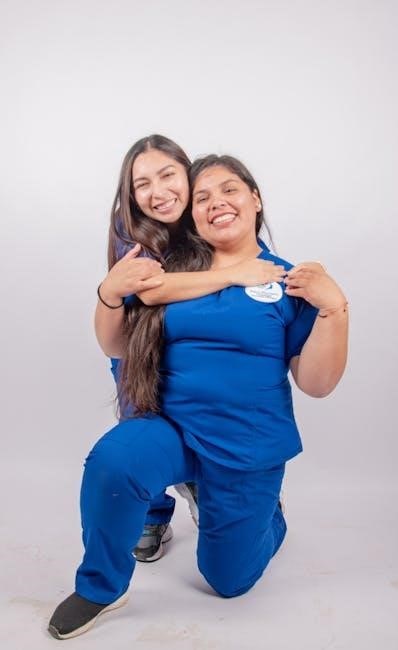
Gerontology nursing focuses on caring for older adults, addressing their unique physical, psychological, and social needs. It emphasizes promoting health, managing chronic conditions, and enhancing quality of life.
1.1 Definition and Scope of Gerontology Nursing
Gerontology nursing, also known as geriatric nursing, focuses on the care of older adults, addressing their unique biological, psychological, and social changes. It involves promoting health, preventing diseases, and managing chronic conditions. The scope includes assessing age-related physical changes, mental health, and social needs, aiming to improve quality of life and functional independence. Gerontology nursing is a specialized field that requires understanding aging processes and tailored interventions for elderly care.
1;2 Importance of Gerontology Nursing in Healthcare
Gerontology nursing plays a vital role in addressing the unique healthcare needs of older adults, a rapidly growing population. As people age, they experience complex physical, cognitive, and social changes, requiring specialized care. Gerontology nurses are essential in managing chronic diseases, preventing functional decline, and enhancing quality of life. Their expertise ensures holistic care, improving health outcomes and reducing healthcare costs. The demand for gerontology nurses continues to rise, making their role crucial in modern healthcare systems.
Gerontology Nursing Exam Questions and Answers
This section provides sample questions and answers to help nurses prepare for gerontology certification exams, covering topics like normal aging, disease management, and care strategies.
2.1 Sample Questions from the American Nurses Credentialing Center (ANCC)
The ANCC provides sample questions to help prepare for the gerontological nursing certification exam. These questions cover a range of topics, including normal aging processes, geriatric diseases, and nursing interventions. Examples include assessing older clients with sleep difficulties or managing medication toxicity in elderly patients. The questions are designed to test critical thinking and clinical judgment, ensuring nurses are well-prepared for real-world scenarios in gerontological care.
2.2 Gerontology Nursing Certification Practice Questions
Gerontology nursing certification practice questions are essential for exam preparation, covering topics like normal aging, geriatric diseases, and nursing interventions. Resources like Quizlet and the ANCC offer sample questions and flashcards to aid studying. These questions address clinical scenarios, such as managing pain in older adults or assessing cognitive changes. Practice exams also include NCLEX-style questions, helping nurses refine their knowledge and critical thinking skills for the certification test;

Key Topics in Gerontology Nursing
Gerontology nursing covers biological changes, psychological aspects, and social factors affecting older adults, ensuring comprehensive care for aging populations.
3.1 Normal Aging Processes and Physical Changes
Normal aging involves gradual physical changes, such as wrinkled skin, loss of muscle mass, and reduced mobility. These changes can affect balance, strength, and overall functionality. Sensory declines, like hearing and vision loss, are common. Additionally, older adults may experience changes in sleep patterns and immune function. Understanding these processes is crucial for gerontology nurses to provide appropriate care and address age-related health issues effectively.
- Physical changes: Include reduced flexibility, bone density loss, and decreased metabolic rate.
- Sensory changes: Impacts vision, hearing, taste, and touch, affecting daily activities.
- Systemic changes: Affects cardiovascular, respiratory, and digestive systems, influencing overall health.
3.2 Psychological and Social Aspects of Aging
Aging brings significant psychological and social changes, including cognitive decline, emotional shifts, and shifts in social roles. Older adults may experience memory loss, depression, or anxiety, impacting their mental well-being. Socially, they may face isolation, loss of loved ones, or changes in family dynamics. Gerontology nurses must address these challenges by promoting mental health, fostering social connections, and supporting adaptive coping strategies to enhance overall quality of life.
- Psychological changes: Include cognitive decline, emotional resilience, and mental health challenges.
- Social aspects: Involve changes in family roles, societal perceptions, and community engagement.
- Support strategies: Focus on fostering independence, social interaction, and emotional well-being.
Common Health Issues in Gerontology Nursing
Gerontology nursing addresses a range of health issues in older adults, including chronic diseases, cognitive decline, and mobility challenges. Common conditions like arthritis, diabetes, and cardiovascular diseases require specialized care. Additionally, mental health concerns such as dementia and depression are prevalent. Nurses must also manage pain effectively and address age-related physiological changes to improve patients’ quality of life.
- Chronic diseases: Arthritis, diabetes, cardiovascular conditions.
- Cognitive decline: Dementia, Alzheimer’s disease.
- Mobility issues: Osteoporosis, balance disorders.
4.1 Geriatric Diseases and Conditions
Geriatric diseases and conditions are prevalent among older adults, requiring specialized nursing care. Common issues include arthritis, diabetes, cardiovascular diseases, and dementia. Nurses must assess and manage these conditions, addressing both physical and mental health challenges. For instance, geriatric patients often experience chronic pain, mobility issues, and cognitive decline. Effective care involves pain management, promoting physical activity, and providing emotional support to enhance overall well-being.
- Arthritis: Joint pain and limited mobility.
- Diabetes: Blood sugar management and complications.
- Dementia: Cognitive decline and memory loss.
- Cardiovascular diseases: Heart failure and hypertension.
4.2 Pain Management in Older Adults
Pain management in older adults requires a tailored approach due to age-related physiological changes. Nurses must assess pain accurately, considering comorbidities and medication interactions. Geriatric patients often experience chronic pain from conditions like arthritis or neuropathy, which can affect their quality of life. Effective strategies include non-pharmacological interventions, such as physical therapy, and careful use of medications like NSAIDs or opioids, while monitoring for adverse effects to ensure safe and effective pain relief.
- Assessment: Use standardized pain scales.
- Interventions: Combine therapies for optimal relief.
- Medication: Tailor dosages to avoid toxicity.
Nursing Care Strategies for Older Adults
Nursing care strategies focus on assessment and intervention techniques to maintain functionality and promote well-being in older adults, ensuring holistic, evidence-based approaches are applied.
5.1 Assessment and Intervention Techniques
Assessment in gerontology nursing involves evaluating physical, cognitive, and functional abilities to identify health challenges. Techniques include comprehensive geriatric assessments and cognitive evaluations. Interventions focus on promoting independence, managing chronic conditions, and preventing complications. Nurses use strategies like pain management, mobility exercises, and assistive devices to enhance quality of life. Effective communication and patient-centered care are key to addressing individual needs and improving outcomes for older adults.
5.2 Promoting Independence and Quality of Life
Promoting independence and quality of life in older adults involves enabling them to perform daily activities, fostering dignity, and supporting psychological well-being. Nurses use strategies like creating personalized care plans, encouraging physical activity, and providing adaptive tools. They also focus on mental stimulation and social engagement to prevent isolation. By addressing individual needs and preferences, gerontology nurses help older adults maintain autonomy, reducing dependency and enhancing overall satisfaction with life.
Legal and Ethical Considerations
Gerontology nursing involves respecting patient autonomy, adhering to advance directives, and ensuring confidentiality. Nurses must address ethical dilemmas compassionately while upholding legal standards of care.
6.1 Advance Directives and Patient Rights
Gerontology nurses must respect patients’ rights and advance directives, ensuring their autonomy in healthcare decisions. Understanding legal documents like living wills and healthcare proxies is crucial. Nurses play a key role in educating patients and families about these directives, fostering informed consent, and upholding ethical standards. This ensures that care aligns with patients’ preferences, even when they cannot communicate their wishes.
6.2 Ethical Dilemmas in Gerontology Nursing
Ethical dilemmas in gerontology nursing often arise from conflicts between patient autonomy, family wishes, and medical recommendations. Common challenges include end-of-life care decisions, resource allocation, and balancing beneficence with patient preferences. Nurses must navigate these issues using ethical principles like respect, justice, and non-maleficence. Collaboration with interdisciplinary teams and clear communication are essential to resolve dilemmas while respecting the elderly patient’s rights and promoting their well-being.
Cultural Competence in Gerontology Nursing
Cultural competence in gerontology nursing involves understanding and respecting diverse values, beliefs, and practices. It enhances care quality by tailoring interventions to meet the unique needs of older adults from varied backgrounds, ensuring sensitive and effective care.
7.1 Understanding Cultural Differences in Aging
Understanding cultural differences in aging is crucial for gerontology nurses. Each culture has unique perspectives on aging, influencing health behaviors and care expectations. For instance, some cultures emphasize family caregiving, while others may rely on community support. Nurses must recognize these variations to provide culturally sensitive care, respecting traditions and values that shape older adults’ experiences and interactions with healthcare systems.
7.2 Communication Strategies for Diverse Populations
Effective communication with diverse older adult populations requires cultural competence and adaptability. Nurses should use simple, clear language, avoiding jargon, and consider non-verbal cues; Incorporating interpreters or translated materials ensures understanding for non-English speakers. Respecting cultural beliefs and practices, such as decision-making roles of family members, enhances trust. Active listening and patience are essential, as older adults may need more time to process information. Tailoring communication strategies to individual needs fosters person-centered care and improves health outcomes.

Technology and Gerontology Nursing
Technology enhances geriatric care through telehealth, enabling remote monitoring and consultations. Wearable devices track vital signs, improving early detection of health issues and promoting proactive interventions for older adults.
8.1 Role of Telehealth in Geriatric Care
Telehealth plays a vital role in geriatric care by enabling remote consultations and monitoring, reducing the need for in-person visits. It improves access to healthcare for older adults with mobility issues or those in rural areas. Telehealth also allows real-time monitoring of chronic conditions, such as diabetes and heart disease, through wearable devices. This technology enhances early detection of health declines, reducing hospital readmissions and improving overall patient outcomes. It also supports caregiver education and provides cost-effective solutions for ongoing care management.
8.2 Wearable Devices and Monitoring Tools
Wearable devices and monitoring tools are essential in geriatric care, enabling real-time tracking of vital signs like heart rate and blood pressure. These devices detect falls, monitor mobility, and ensure medication adherence. They provide early detection of potential health issues, allowing timely interventions. Such tools enhance safety, independence, and quality of life for older adults, while reducing hospitalizations and improving overall care management. They are particularly beneficial for those with chronic conditions, offering personalized health insights.

Caregiver Support and Education
Caregivers require education on effective care strategies, symptom management, and emotional support. Access to community resources and professional guidance enhances their ability to provide quality care for older adults.
9.1 Family Involvement in Caregiving
Family involvement is crucial in caregiving, providing emotional and physical support to older adults. Education on caregiving strategies, symptom management, and resource utilization empowers families to deliver effective care. Addressing challenges like balancing personal life and caregiving responsibilities is essential.Support systems and community resources help reduce caregiver burnout, ensuring better outcomes for both caregivers and older adults.
9.2 Community Resources for Caregivers
Community resources play a vital role in supporting caregivers of older adults. These include home care services, adult day care programs, and respite care to provide temporary relief. Support groups and counseling services help caregivers cope with emotional challenges. Educational programs and workshops offer practical skills and strategies for effective caregiving. Access to these resources enhances caregivers’ ability to provide high-quality care while maintaining their own well-being.

Career Opportunities in Gerontology Nursing
Gerontology nursing offers diverse career opportunities, including Gerontological Nurse Practitioners, Clinical Nurse Specialists, and Educators, with growing demand in hospitals, clinics, and academic settings.
10.1 Roles and Specializations in Gerontology Nursing
Gerontology nurses specialize in various roles, including Gerontological Nurse Practitioners, Clinical Nurse Specialists, and Nurse Educators. They work in diverse settings like hospitals, long-term care facilities, and community health organizations. Specializations may include palliative care, wound care, and rehabilitation. These roles require advanced skills in managing chronic conditions, promoting healthy aging, and addressing the unique needs of older adults. The demand for these specialists continues to grow.
10.2 Future Outlook for Gerontology Nurses
The demand for gerontology nurses is expected to rise significantly due to the aging population. Opportunities in hospitals, long-term care facilities, and community health settings will expand. Advances in technology and personalized care will shape the future of gerontology nursing. Additionally, there will be a growing need for specialists in chronic disease management, palliative care, and mental health. This field offers a promising career path for nurses passionate about improving the lives of older adults.